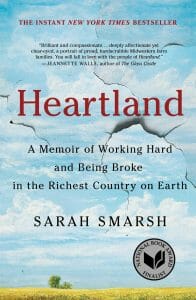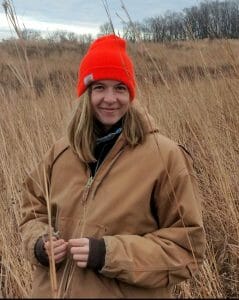Review of “Heartland: A Memoir of Working Hard and Being Broke in the Richest Country on Earth”
 “Heartland,” by Sarah Smarsh, is a memoir of family, a love letter to the child she never had as a teenager and an account of how poverty shapes a life without stability. It is a deeply researched account that follows four generations of her family – of young, single mothers across the windy plains of Kansas – and describes the economic and social context that prevented Sarah from having a stable childhood.
“Heartland,” by Sarah Smarsh, is a memoir of family, a love letter to the child she never had as a teenager and an account of how poverty shapes a life without stability. It is a deeply researched account that follows four generations of her family – of young, single mothers across the windy plains of Kansas – and describes the economic and social context that prevented Sarah from having a stable childhood.
Sarah illustrates not only her life, but her mother’s, her grandmother’s and her great-grandmother’s, showing that the cycle of poverty has lasting repercussions. She shows not only what poverty looks like for a rural family in the heartland, but how it feels and lasts in the way one thinks. Through her poignant storytelling, both from her own memory and carefully researched family history, we gain a sense of perspective through the generations.
The chapters Sarah writes of her life on the farm contain a spirit and connection to place we can all relate to. I could feel the strong winter wind that rips across the Great Plains and gets into your bones – not just as an imagining, but as a memory. When she writes of the red Kansas dirt and the way the wheat planting and harvest schedule overlaid their lives, I found myself replacing it in my mind with our rich clay and the dominant rituals of corn and beans that surround us. Connection to place always speaks to me, and I’ve often wondered why I feel so strongly about where I am. Sarah’s book helps to answer that question.
So often, the Midwest is a region overlooked by scholars and writers. The complex history of our country’s policies shaped the very patchwork of fields and rivers across this heartland; yet it is hard to find words that put this place into context.
Sarah Smarsh does just that. Through telling her family’s history, stories from her parents and grandparents, overlaid by meticulously researched policies and programs, Sarah is able to illustrate to us how the actions of politicians impacted the lives of millions of working class and poor people in the Midwest, which in turn, also shaped the farmland. Ultimately, what she makes clear is that family, farming and failure are not reflective of an individual’s actions alone. Instead, they are dependent upon the decisions made by people in power – often with very little understanding of their constituents.
Sarah writes of a place that she loves, with great detail and respect for the land and her family, without sacrificing some of the hard truths we must acknowledge about land, class and poverty in the U.S.
 For myself, a millennial farmer reader, Sarah writes about times I’ve only heard of: the farm crisis of the 1980s, the Great Depression, her grandpa’s farm’s auction held after his death. She puts words to things it seems like most folks have tried to forget.
For myself, a millennial farmer reader, Sarah writes about times I’ve only heard of: the farm crisis of the 1980s, the Great Depression, her grandpa’s farm’s auction held after his death. She puts words to things it seems like most folks have tried to forget.
Our agricultural landscape of today begs us to understand how we got here. I know what it feels like to be one of the few young people who stayed. I know how it feels to drive through our depopulated state and feel the hopelessness of a deserted Main Street. I know how impossible it is for young, beginning farmers (especially farmers of color) to access land on which to grow.
“Heartland” reminds us that there are greater powers at play: that the economics and politics of rural flyover states don’t hold much weight compared to those from other places; that those people might not fight for us in the way we need. But it also reminds us that it is okay to love what is good – hard work, the feeling after a long day of harvesting a good crop, the connection you feel after helping an animal give birth – while fighting for what is better.
Maja Black is a member of the Sundog Farm crew in Solon, Iowa, where they raise four seasons of vegetables and rotationally graze sheep and goats.
